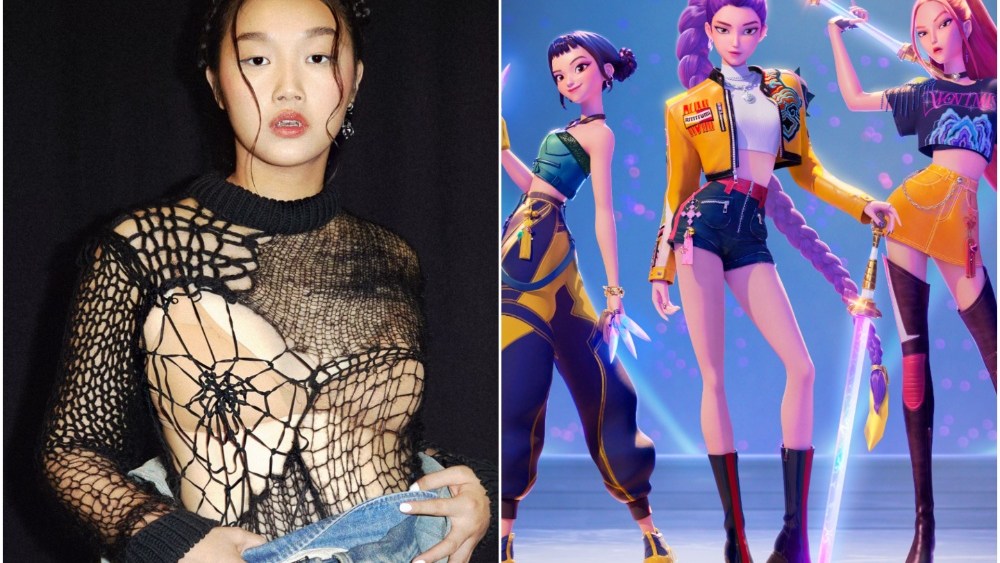The jet lag is real for Audrey Nuna. Fresh off an international tour that took her from Korea to Japan to Australia, the 26-year-old singer-rapper is still adjusting to time zones — including a memorable 3 a.m. gym session that left her wired until 8:00 in the morning. But the exhaustion is worth it: Nuna is riding the wave of “Golden,” her breakout contribution to the “KPop Demon Hunters” soundtrack that has become a viral global phenomenon.
Nuna provides the singing voice for Mira, one of three members of the fictional K-pop group Huntr/X, alongside vocalists Ejae (who voices lead singer Rumi) and Rei Ami (who voices Zoey). Together, the trio performed “Golden,” which hit No. 1 on Spotify’s Daily Top Songs Global chart and propelled the soundtrack album to No. 1 on the Billboard 200 — the biggest streaming week for a soundtrack in over three years.
“When I was recording these songs and working on this project, I distinctly remember telling my mom, oh, and this was in Korean, ‘but like, oh, ‘Eomma, I think that this movie is going to do really well,’” Nuna recalls. “I really did have a feeling that this project was going to do very well. I didn’t know that it was just going to completely obliterate its own niche in the sense of just becoming so globally received.”
The Korean-American artist’s instincts proved prescient. The song is being submitted for Academy Award consideration by Netflix, a prospect that has Nuna both amazed and philosophical.
“I feel like now I just have to go for the EGOT at this point,” she says. “I think God and the universe are so incredibly mysterious in that way, where I cannot believe that I could potentially be getting an Oscar nomination, and this project could potentially be getting an Oscar nomination before I’ve even ever been considered for a Grammy nomination.”
The potential Oscar nod feels especially surreal given Nuna’s namesake. “I am actually named after Audrey Hepburn, who was known to be super multifaceted. She was both in theater and obviously in acting, and also did music. So I feel, as astounding as it all is, it weirdly it does feel weirdly prophetic in some ways.”
For Nuna, who blurs the lines between pop, R&B, and alternative on her genre-fluid anthems, the success of “Golden” has reinforced her belief in artistic boundary-pushing. “I do think those lines are irrelevant. I do think genre is dead, in a sense,” she says. “I personally have always been interested in so many different types of music.”
Growing up as one of the few Asian Americans in her New Jersey suburb, Nuna absorbed diverse influences — from Britney Spears and early K-pop groups like Wonder Girls to Whitney Houston, Destiny’s Child, Childish Gambino, Radiohead, and Björk. This eclectic musical education shaped her refusal to be categorized.
“I’ve never felt the need or desire to hide any of those kinds of interests,” she explains. “When this movie was pitched to me, it was this idea of not having to pick one part of yourself and being able to be your full self. That is really the reason why, when this role was pitched to me to be a part of this project, I immediately hopped on board.”
That philosophy of embracing duality runs through Nuna’s recent album “Trench,” split into two halves: “Soft Skin” and “Hard Feelings.” The concept reflects polarities she’s always felt drawn to — “beautiful chords and super harsh drum sounds” or “playful double entendre wordplay with kind of these deep introspective topics.”
“I wanted to show that they can coexist and they can sit side by side in a track list, whether that be sonically or thematically,” she says.
Nuna’s recent international touring — her first time performing outside the U.S. — proved eye-opening. From the explosive energy at Korea’s Pentaport Festival to more reserved but deeply connected audiences in Tokyo, she discovered that music truly transcends cultural boundaries.
“The one thing that felt really constant was just this, like, true and deep connection that all these wonderful people who came to my show have with the music that I make. It was really cool to see how, regardless of, like, the body language, regardless of the level of noise in the audience, that this really always translates for me,” she reflects.
The experience reinforced her belief in music’s transformative power. “It’s really restored my faith in this idea that music can change the way people think and can change the way people carry themselves in their everyday lives, regardless of the culture that you’re brought up in.”
As Nuna navigates this new phase of global recognition, she’s learned to view vulnerability not as weakness, but as strength. Citing Brené Brown’s “Atlas of the Heart,” she explains: “Your level of belonging will only ever be as great as your level of self acceptance.”
For now, Nuna is still processing the whirlwind success of “Golden,” and “KPop Demon Hunters,” which is now Netflix’s most-watched movie ever. As the accolades continue to pour in and Oscar season approaches, one thing is clear: This genre-defying artist is just getting started.
“I definitely feel like just overwhelmed with gratitude. I feel a sense of just extreme humility and just very honored to be a part of a project that is bringing Korean culture to such a different level of platform,” she says.

